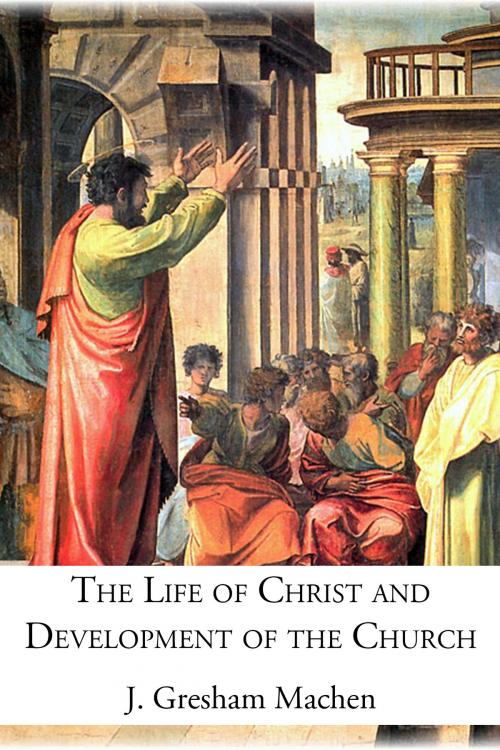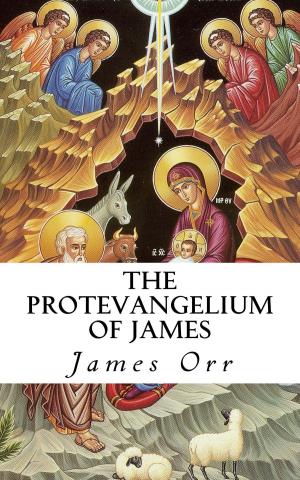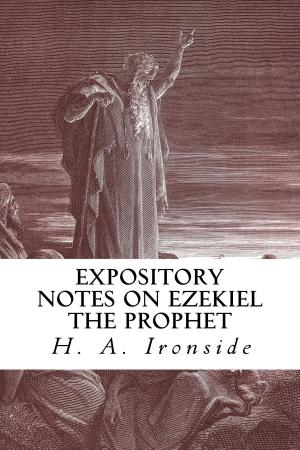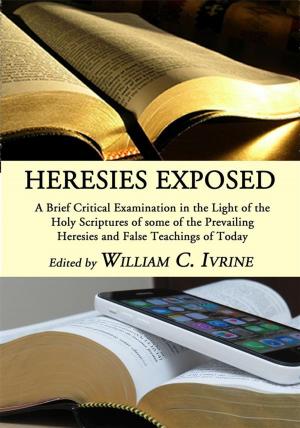The Life of Christ and Development of the Church
Nonfiction, Religion & Spirituality, Bible & Bible Studies, New Testament, Study, Christianity, Church, Church History| Author: | J. Gresham Machen | ISBN: | 1230001922813 |
| Publisher: | CrossReach Publications | Publication: | September 21, 2017 |
| Imprint: | Language: | English |
| Author: | J. Gresham Machen |
| ISBN: | 1230001922813 |
| Publisher: | CrossReach Publications |
| Publication: | September 21, 2017 |
| Imprint: | |
| Language: | English |
At the time when the Old Testament narrative closes, the Jews were under the rule of Persia. The Persian control continued for about one hundred years more, and then gave way to the empire of Alexander the Great. Alexander was king of Macedonia, a country to the north of Greece; but the language and culture of his court were Greek. After Greece proper had been conquered by Alexander’s father, Philip, Alexander himself proceeded to the conquest of the East. The Persian Empire fell in 331 B.C., and with the other Persian possessions Jerusalem came into the hands of the conqueror. In 323 B.C., when Alexander died, his vast empire, which extended around the eastern end of the Mediterranean Sea and to the borders of India, at once fell to pieces. But the kingdoms into which the empire was divided were to a large extent Greek kingdoms. Short-lived, therefore, as Alexander’s empire was, it had the permanent effect of spreading the Greek language and Greek civilization over the Eastern world. It became thus, as will be seen, one of the most important factors in the divine preparation for the gospel.
After the death of Alexander, the country of Judea became a bone of contention between two of the kingdoms into which Alexander’s empire was divided—the Greek kingdom of Syria and the Greek kingdom of Egypt. At last, however, the Syrian kingdom, with its capital at Antioch, near the northeastern corner of the Mediterranean Sea, gained the upper hand. Judea became part of the territory of the Syrian monarchs.
In the reign of Antiochus IV of Syria, called Antiochus Epiphanes, 175-164 B.C., the Jews began a war for independence. Antiochus Epiphanes had desecrated the Temple at Jerusalem by setting up an image of a heathen god in the Holy of Holies. The result was the glorious revolt of the Jews under Mattathias and his sons—the family of the Maccabees. The Maccabean uprising, of which a stirring account has been preserved in the First Book of the Maccabees, an apocryphal book attached to the Old Testament, certainly constitutes one of the most glorious chapters in the history of liberty. The uprising was successful, and for about one hundred years the little country of the Jews, though surrounded by powerful neighbors, succeeded in maintaining its independence.
At first the Maccabees had been animated by a religious motive; the revolt had been due not to an interference with what may be called civil liberty, but to the desecration by Antiochus Epiphanes of the Temple and to the attempt at prohibiting the worship of Jehovah. As time went on, however, the Maccabean rulers became more worldly in their purposes and thus alienated the devout element among their people. Hence the little kingdom became an easy prey to the next great world empire which appeared upon the scene.
That empire was the empire of Rome. Originally a small city-state in Italy, Rome had gradually extended her conquests until she came into conflict with Greece and with the Greek kingdoms of the Eastern world. Weakened by many causes, the successors of Alexander soon succumbed, and among them the monarchs of Syria. Judea could not resist the new conqueror. In 63 B.C., the famous Roman general, Pompey, entered Jerusalem, and Jewish independence was at an end.
The Roman control was exerted in Palestine for a time through subservient high priests, until in 37 B.C. Herod the Great was made king. Herod was not a real Jew, but an Idumaean; and at heart he had little or no attachment to the Jews’ religion. But he was wise enough not to offend Jewish feeling in the outrageous way that had proved so disastrous to Antiochus Epiphanes. Throughout his reign Herod was of course thoroughly subservient to the Romans; though a king, he was strictly a vassal king. Herod reigned from 37 B.C. to 4 B.C. His kingdom embraced not only Judea, but all Palestine. It was near the end of Herod’s reign that our Saviour was born. Thus the reckoning of the Christian era, which was instituted many centuries after Christ, is at least four years too low; Jesus was born a little earlier than 4 B.C.
When Pompey conquered Jerusalem in 63 B.C, Rome was still a republic. But before many years had elapsed Julius Caesar assumed the supreme power, and the ancient Roman liberties were gone. After the assassination of Caesar in 44 B.C., there was a long period of civil war. Finally Augustus was triumphant, and the Roman Empire began. In the long reign of Augustus, 27 B.C. to A.D. 14, our Saviour was born.
The political events which have just been outlined did not take place by chance. They were all parts of the plan of God which prepared for the coming of the Lord. When Jesus finally came, the world was prepared for his coming.
In the first place, the Roman Empire provided that peace and unity which was needed for the spread of the gospel. War interrupts communication between nations. But when the apostles went forth from Jerusalem to spread the good news of Christ to the world, there was no war to interrupt their course. Nation was bound to nation under the strong hand of Rome. Travel was comparatively safe and easy, and despite occasional persecution the earliest missionaries usually enjoyed the protection of Roman law.
In the second place, the Greek language provided a medium of communication. When the Romans conquered the Eastern world, they did not endeavor to substitute their own language for the language which already prevailed. Such an attempt would only have produced confusion. Indeed, the Romans themselves adopted the Greek language as a convenient medium of communication. Greek thus became a world language. The original, local languages of the various countries continued to be used (Aramaic, for example, was used in Palestine), but Greek was a common medium. Thus when the apostles went forth to the evangelization of the world, there were no barriers of language to check their course.
In the third place, the dispersion of the Jews provided the early missionaries everywhere with a starting point for their labors. As a result not only of captivity, but also of voluntary emigration, the Jews in the first century were scattered abroad throughout the cities of the world very much as they are scattered to-day. But there was one important difference. To-day the Jewish synagogues are attended only by Jews. In those days they were attended also by men of other races. Thus when Paul and the other Christian missionaries exercised their privilege of speaking in the synagogues, they were speaking not only to Jews but also to a picked audience of Gentiles.
At the time when the Old Testament narrative closes, the Jews were under the rule of Persia. The Persian control continued for about one hundred years more, and then gave way to the empire of Alexander the Great. Alexander was king of Macedonia, a country to the north of Greece; but the language and culture of his court were Greek. After Greece proper had been conquered by Alexander’s father, Philip, Alexander himself proceeded to the conquest of the East. The Persian Empire fell in 331 B.C., and with the other Persian possessions Jerusalem came into the hands of the conqueror. In 323 B.C., when Alexander died, his vast empire, which extended around the eastern end of the Mediterranean Sea and to the borders of India, at once fell to pieces. But the kingdoms into which the empire was divided were to a large extent Greek kingdoms. Short-lived, therefore, as Alexander’s empire was, it had the permanent effect of spreading the Greek language and Greek civilization over the Eastern world. It became thus, as will be seen, one of the most important factors in the divine preparation for the gospel.
After the death of Alexander, the country of Judea became a bone of contention between two of the kingdoms into which Alexander’s empire was divided—the Greek kingdom of Syria and the Greek kingdom of Egypt. At last, however, the Syrian kingdom, with its capital at Antioch, near the northeastern corner of the Mediterranean Sea, gained the upper hand. Judea became part of the territory of the Syrian monarchs.
In the reign of Antiochus IV of Syria, called Antiochus Epiphanes, 175-164 B.C., the Jews began a war for independence. Antiochus Epiphanes had desecrated the Temple at Jerusalem by setting up an image of a heathen god in the Holy of Holies. The result was the glorious revolt of the Jews under Mattathias and his sons—the family of the Maccabees. The Maccabean uprising, of which a stirring account has been preserved in the First Book of the Maccabees, an apocryphal book attached to the Old Testament, certainly constitutes one of the most glorious chapters in the history of liberty. The uprising was successful, and for about one hundred years the little country of the Jews, though surrounded by powerful neighbors, succeeded in maintaining its independence.
At first the Maccabees had been animated by a religious motive; the revolt had been due not to an interference with what may be called civil liberty, but to the desecration by Antiochus Epiphanes of the Temple and to the attempt at prohibiting the worship of Jehovah. As time went on, however, the Maccabean rulers became more worldly in their purposes and thus alienated the devout element among their people. Hence the little kingdom became an easy prey to the next great world empire which appeared upon the scene.
That empire was the empire of Rome. Originally a small city-state in Italy, Rome had gradually extended her conquests until she came into conflict with Greece and with the Greek kingdoms of the Eastern world. Weakened by many causes, the successors of Alexander soon succumbed, and among them the monarchs of Syria. Judea could not resist the new conqueror. In 63 B.C., the famous Roman general, Pompey, entered Jerusalem, and Jewish independence was at an end.
The Roman control was exerted in Palestine for a time through subservient high priests, until in 37 B.C. Herod the Great was made king. Herod was not a real Jew, but an Idumaean; and at heart he had little or no attachment to the Jews’ religion. But he was wise enough not to offend Jewish feeling in the outrageous way that had proved so disastrous to Antiochus Epiphanes. Throughout his reign Herod was of course thoroughly subservient to the Romans; though a king, he was strictly a vassal king. Herod reigned from 37 B.C. to 4 B.C. His kingdom embraced not only Judea, but all Palestine. It was near the end of Herod’s reign that our Saviour was born. Thus the reckoning of the Christian era, which was instituted many centuries after Christ, is at least four years too low; Jesus was born a little earlier than 4 B.C.
When Pompey conquered Jerusalem in 63 B.C, Rome was still a republic. But before many years had elapsed Julius Caesar assumed the supreme power, and the ancient Roman liberties were gone. After the assassination of Caesar in 44 B.C., there was a long period of civil war. Finally Augustus was triumphant, and the Roman Empire began. In the long reign of Augustus, 27 B.C. to A.D. 14, our Saviour was born.
The political events which have just been outlined did not take place by chance. They were all parts of the plan of God which prepared for the coming of the Lord. When Jesus finally came, the world was prepared for his coming.
In the first place, the Roman Empire provided that peace and unity which was needed for the spread of the gospel. War interrupts communication between nations. But when the apostles went forth from Jerusalem to spread the good news of Christ to the world, there was no war to interrupt their course. Nation was bound to nation under the strong hand of Rome. Travel was comparatively safe and easy, and despite occasional persecution the earliest missionaries usually enjoyed the protection of Roman law.
In the second place, the Greek language provided a medium of communication. When the Romans conquered the Eastern world, they did not endeavor to substitute their own language for the language which already prevailed. Such an attempt would only have produced confusion. Indeed, the Romans themselves adopted the Greek language as a convenient medium of communication. Greek thus became a world language. The original, local languages of the various countries continued to be used (Aramaic, for example, was used in Palestine), but Greek was a common medium. Thus when the apostles went forth to the evangelization of the world, there were no barriers of language to check their course.
In the third place, the dispersion of the Jews provided the early missionaries everywhere with a starting point for their labors. As a result not only of captivity, but also of voluntary emigration, the Jews in the first century were scattered abroad throughout the cities of the world very much as they are scattered to-day. But there was one important difference. To-day the Jewish synagogues are attended only by Jews. In those days they were attended also by men of other races. Thus when Paul and the other Christian missionaries exercised their privilege of speaking in the synagogues, they were speaking not only to Jews but also to a picked audience of Gentiles.















